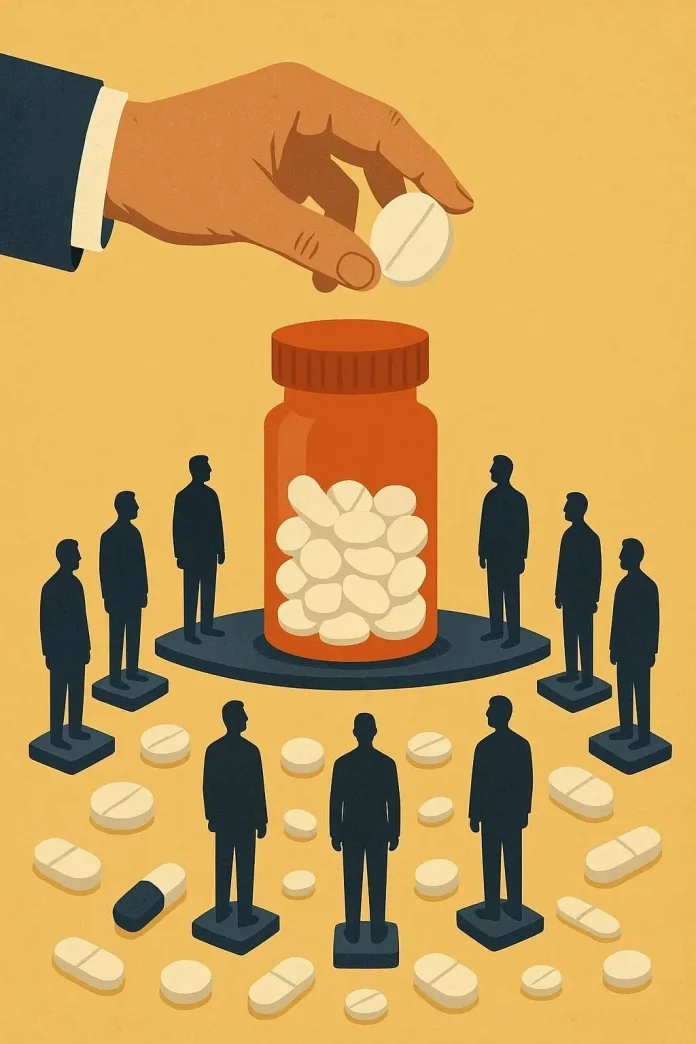By Sebi Alla
In a highly coordinated operation, a major domestic manufacturer, eight wholesale import-distribution companies, and reasonable suspicion of price and quality control have turned 3069 licensed pharmacies across the country into outlets selling products dictated by pharmaceutical wholesalers.
Alongside the market dominance of large producers and distributors, experts in the field raise concerns about the declining quality of medicines, affecting not only reimbursable drugs but also those sold in open pharmacies.
“The Albanian open-network pharmacy market is sinking under the grip of monopolization,” former President of the Order of Pharmacists, Diana Toma, told Faktoje.al.
State institutions also recognize the monopolization of the market in determining prices and types of medicines, concentrating the production and wholesale-to-retail process in the hands of a few entities.
“The price of medicines in the pharmaceutical market is not a competitive factor, as its fixation for at least six months and its determination on the control stamp makes it unchangeable, limiting competition on product prices by the actors within this market.” This is the conclusion reached by the Competition Authority after a lengthy investigation, resulting in a final report released in October 2022.
Complete control over prices and products!
“In Albania, there are 3069 licensed pharmacies; importers and distributors in the pharmaceutical market (wholesale trade of medicines) hold 233 licenses; manufacturers in the pharmaceutical sector (medicine production) hold 10 licenses; and hospital pharmacies (hospital services) hold 27 licenses,” the National Business Center (QKB) told Faktoje.al.
Even though 233 licenses have been granted for entities involved in wholesale medicine trade, the actual number of active players is much smaller.
According to a Competition Authority investigation, there were 13 major pharmaceutical companies in 2022.
However, Faktoje.al’s checks and data analysis, including information from the Competition Authority’s investigation, indicate that currently only eight major entities control the market. By opening branches under different trade names, they “cover” their activities, giving the de jure impression that there are many wholesale companies in the country.
“In the pharmaceutical market, there is a layering: import-distribution in one category and manufacturers in another, but the products of both categories reach citizens through open-network pharmacies. The bottom of the funnel is the open-network pharmacy. Some products go to hospitals via tenders, while the rest is distributed to citizens through pharmacies,” Toma explains.
Major manufacturing entities
Faktoje.al referred to the investigation of the Competition Authority, which in a detailed analysis clearly points out only one domestic pharmaceutical manufacturing company, Profarma, and eight other trading companies.
The NBC has 10 manufacturing entities registered, but Diana Toma explains that “only one company is a pharmaceutical producer (Profarma), while the other companies manufacture medical technical products or para-pharmaceutical products.”
In the same report (October 2022, the most recent), the Competition Authority reviewed the pharmaceutical market and found that: “Based on the analysis of data on the value of medicines produced in the country and sold by enterprises authorized for production and trade, it resulted that Profarma is the largest pharmaceutical producer in the country, followed by Noval and Florfarma. From a cross-check of the data submitted by Profarma JSC and the HIIH (the list of reimbursable medicines), it is evident that in the list of reimbursable medicines, Profarma’s products are, in almost all cases, the cheapest alternative within the generic drug,” says the CA, which also did not find violations, since although it notes market dominance, this is balanced by the low price of medicines, particularly those reimbursable.
Trading entities
In its investigation, the Competition Authority points out that state institutions, in particular the National Agency of Medicines and Medical Devices (NAMMD), had not provided the necessary documents regarding the manufacturing and trading companies, the amount of medicines they had imported, and their quality. Still, the Competition Authority concluded that for 2022 “the largest import enterprises of medical medicines are (Rejsi Farma LLC, Incomed LLC, Evita LLC, IMI Pharma LLC, Trimed LLC, Aldosch Farma LLC, Fufarma JSC, Pegasus LLC, CFO Pharma LLC, Delta Pharma-AL LLC, Megapharma LLC and Intermed LLC).”
The CA also observed that one trading entity dominated in 2020 with the “flu vaccine,” considering this a violation, since around 75% of this vaccine was available only in the open pharmacies belonging to the network of that importing entity.
“At the conclusion of the investigative procedures, the Competition Authority determined that: ‘the fixing of medicine selling prices at every trading level, as defined in DCM no. 143, dated 18.2.2015 “On setting the trading and manufacturing margins of medicines,” points 1, 2 and 3, restricts competition in the wholesale and retail trade of medicines.’ The same institution further noted that, ‘the existence of vertical integration between pharmaceutical importing companies and retail pharmacy networks may lead to the creation of a dominant market position.”
Despite the findings of the Competition Authority, the pharmaceutical market in the country has not only failed to change but is increasingly tightening its control in the hands of a small group of manufacturers and wholesale and retail traders of medicines.
“…In the open pharmacies there are large importing companies which seem to have expanded from wholesale trade to the final stage. They have opened their own pharmacy networks,” says Toma, adding that this has resulted in “a full monopolization from production, large pharmaceutical warehouses, distribution, and then retail trade through their networks of open pharmacies.”
A pharmacy at every step…!
Three controversial laws from 2009, 2014, and 2015, under the slogan of greatly expanding pharmacy licensing and lowering medicine prices, now appear to have led to the domination of the pharmaceutical market by a small group of businessmen, one domestic drug manufacturer and eight major importing companies, which also control retail pharmacy networks, completing the production–trade–sales cycle.
In 2009, Parliament passed Law no. 10081, on licenses and permits, proposed by the government.
“Until 2009, pharmacy opening permits were granted by the Ministry of Health based on professional criteria, distance, and other factors. After this law was passed, those criteria were removed, and any individual who found a premises, even next to another pharmacy, could, simply by submitting a self-declaration to the NBC, obtain the right to open a pharmacy,” Diana Toma, former president of the Order of Pharmacists, told Faktoje.al.
“In 2009, when the right was granted to anyone to open a pharmacy, the link between the pharmacist and pharmacy ownership was broken. Responsibility was shifted to the technical manager, and in this way, we created an artificial shield for the pharmacy owner to commit violations without concern, since the ‘bills’ would be paid by the technical manager of the pharmacy, who was no longer the owner,” says Toma, stressing that this system removed professional pharmacists from the market and elevated commercial priorities even in the healthcare field.
Two laws that lowered quality and “captured” the market…!
In 2014, former Health Minister Ilir Beqja, over the course of several months, promised fundamental reforms in the healthcare system through the law on medicines for the pharmaceutical service, assuring price cuts and state oversight. The amendments to this law, made a year later, further solidified the domestic pharmaceutical industry, predetermining prices, quality, and indirectly deciding which companies would have greater access to this key market. “The origin of the substitute medicines, replacing patented drugs, will inevitably have lower prices, but this created a suffocating environment for prestigious companies,” says Toma. “We have many pharmacies going bankrupt that are owned by professional pharmacists, while the number of pharmacies owned by these networks continues to grow. We see that pharmaceutical networks sell products cheaper than what we buy from warehouses. Which phenomenon are we facing? The phenomenon of investing to close other pharmacies, which is a violation and an unfair closure, or the phenomenon of money laundering,” emphasizes the former president of the Order of Pharmacists.
Who is in control?
The National Agency of Medicines and Medical Devices (NAMMD), in an official response to Faktoje.al, stated that the following are authorized for trade in Albania:
“Medicines produced domestically; medicines that have obtained trading authorization and circulate in any of the European Union countries, the United States, Canada, Turkey, Switzerland, Israel, Japan, Australia, Norway, Iceland, and the United Kingdom; medicines that have received local trading authorization and circulate within the country; medicines produced in Balkan countries, only when they have obtained trading authorization and circulate in their home country; and medicines authorized for marketing by the EMA or FDA.”
Although there are five types of authorization, the medicines dominating the market for hospital use and private pharmacies are those produced domestically, in Turkey, or in one of the Balkan countries, mainly Serbia.
“Prestigious foreign companies that were active until 2015 left, either forced by legal requirements or because they realized that government price controls would reduce their prices, meaning they would lose access to the market,” says pharmaceutical expert Diana Toma.
According to her, the forced exit of major pharmaceutical companies was not coincidental. “In my assessment, the market shift was carried out solely for pure profit interests of a certain class or category of individuals, completely disregarding the importance of the presence of pharmaceutical representatives in Albania, who in themselves are guarantors of the stability of a country’s pharmaceutical market.”











